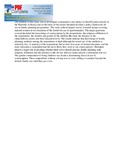| dc.description.abstract | The purpose of this study was to investigate contraceptive prevalence in Kisii/Nyamira district in the Republic of Kenya and on the basis of the results obtained develop a policy framework for use in family planning programmes. The study utilized largely survey research design covering married women in two locations of the district bu use of questionnaires. The major questions covered included the knowledge of contraception by the despondents, the religious affiliation of the respondents, the number and gender of the children they had, the distance to the clinic/delivery points and their education level.
The results indicate that knowledge of family planning methods among the respondents is high although the actual use of the methods is relatively low. A majority of the respondents had at least four years of formal education, and the more education a respondent had the more likely they were to use contraceptives. Husbands played a major role in deciding whether their wives should practise family planning with religious affiliation and the distance to the service delivery points played a substantial role too. The gender composition of living children was found a determining factor in use of contraception. Those respondents without a living son (s) were willing to continue beyond the desired family size until they got a son. | en |

